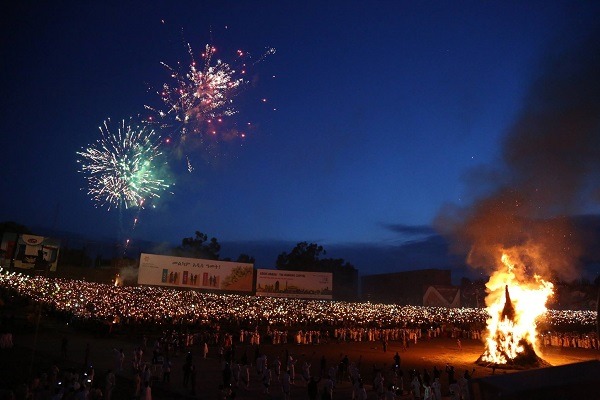Meskel is an annual religious holiday in the Ethiopian Orthodox and Eritrean Orthodox churches, which commemorates the discovery of the True Cross by the Roman Empress Helena in the fourth century. Meskel occurs on the 17 Meskerem in the Ethiopian calendar (September 27, Gregorian calendar). “Meskel” is Ge’ez for “cross”.
The main national feast is held in Meskel Square, a huge square in Addis Ababa named and dedicated particularly for the celebration of the feast, with a semi-circular stadium viewing area for tens of thousands of people. The celebration is presided over by bishops and civic leaders. In the 2013 celebration pictured here, the Catholic metropolitan archbishop participated in the celebration. While the celebrations in the capital are large, Meskel is a time when many urbanites return home to villages. Neighborhoods and villages celebrate the Meskel in thousands of local celebrations.
The celebration begins in earnest on September 26, the eve of the feast. That morning, in public squares or at intersections, people prepare the demera, a tall pyramid of branches that looks from a distance like a fir tree, topped with a cross of Meskel flowers. In the late afternoon, people dance and celebrate in the area around the demera. At Meskel Square, dozens of large dance groups move through the square below the viewing stand. Clergy and public leaders give speeches, and floats with biblical themes parade around the grounds.
As darkness begins to set in, the demera is set ablaze. The smoke is said to recall the smoke that supposedly led Empress Helena to the site of the True Cross. Celebrants then feast together, whether at the demera site or with their families. The following day, the official day of the Feast of the Finding of the True Cross, Ethiopians attend liturgy and a feast and celebrate with family and friends. Many use the ashes from the demera to mark themselves with a cross.
Meskel is said to be particularly valued and well celebrated among Gurage people. Adult children, especially those who have moved away from the village in search of their fortunes, are expected to provide a bull or goat for their parents to slaughter for Meskel. The slaughter itself is part of the feast. An elder male blesses the animal with the sign of the cross, a request that God save the people in the coming year and provide prosperity for the children who provided the animal. The men take a shot of local alcohol, and the bull is slaughtered.
The bull has to fall to the right side, or at least be turned afterward on that side. The meat is prepared in a variety of ways and shared with celebrants, and can last a week.




